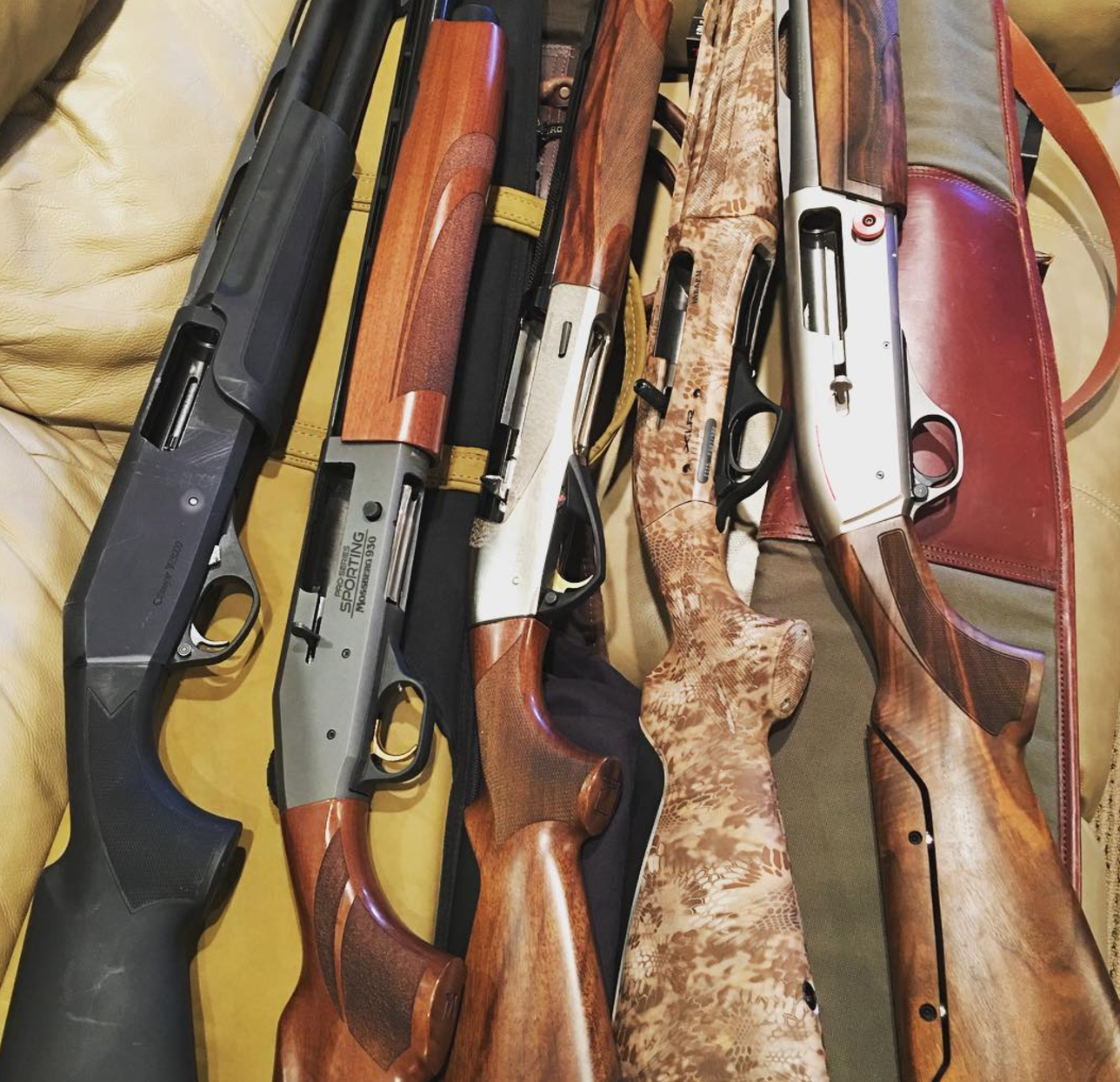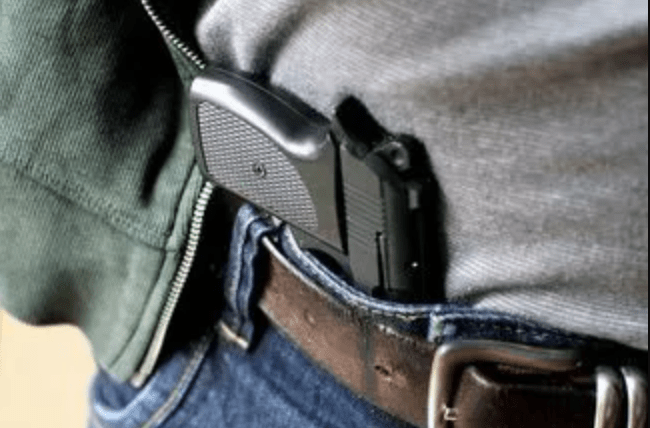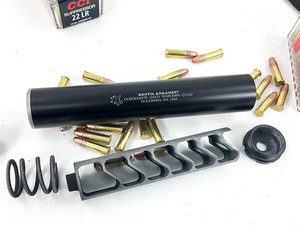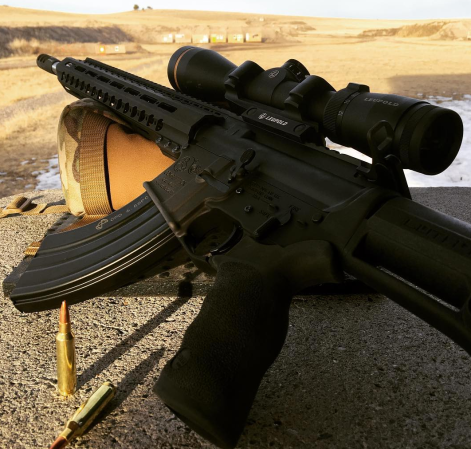We may earn revenue from the products available on this page and participate in affiliate programs. Learn More ›
TOP STORY
Gun-Owners’ Due Process Included in 21st Century Cures Act
Senate Democrats spent the summer staging dog-and-pony diversions to promote a gun control agenda they gambled would frighten a TV-educated electorate into voting for them in November. It was a crass ploy to sustain a perceived issue rather than address a perceived issue for unadulterated political gain.
As we now know, that callous strategy backfired miserably on Nov. 8, as evidenced by the Nov. 30 adoption of The 21st Century Cures Act in a 392-26 vote.
There are many aspects of this wide-ranging bill that address many varied issues. Among the things it will do is speed up the Food & Drug Administration’s approval of new drugs, invest new money in medical research, dedicate $1 billion over two years to fight the epidemic of opioid addiction and allocate $1.8 billion for Vice President Biden’s cancer “moonshot.”
Tucked away in the 996-page bill is Rep. Tim Murphy’s (R-Pa.) Helping Families in Mental Health Crisis Act, which had been approved 422-2 by the House in July, but got nowhere in the Senate where Democrats saw no value in addressing a problem they needed to remain a problem until after the elections.
While some of components of Murphy’s bill incorporated into The 21st Century Cures Act are scaled back from the bill passed in July, key elements — such as lifting restrictions on Medicaid paying for mental health care, and establishing a new assistant secretary for mental health in the Department of Health and Human Services — remain. Among other pivotal survivors are due-process protections for gun owners, especially veterans, from having their Second Amendment rights arbitrarily denied by virtue of being diagnosed with a mental illness.
Murphy’s bill was among real world attempts to address mass shootings since most are perpetuated by people who are either diagnosed or not diagnosed with a mental illness. By expanding the scope and accessibility of mental health care, the design is to get more people who are struggling with mental health issues into care. And, certainly, once evaluated and being treated, it is prudent to restrict patients’ access to firearms.
Murphy’s bill, however, defines under what circumstances a patient can have access to firearms restricted and identifies a due-process procedure in which access can be restored. This is particularly critical for veterans deemed incapable of handling their financial affairs by the Veterans’ Administration, which can arbitrarily deny their right to possess or purchase a weapon without any recourse or capacity to challenge the designation.
And because it contained this due-process clause, Senate Democrats would not vote for it, claiming it didn’t address gun violence when, in fact, it did just that. The truth is, they couldn’t allow Republicans to offer a solution to a problem that they, Democrats, needed to sustain for political gain.
But all that is over now. Unlike Murphy’s Helping Families in Mental Health Crisis Act, which languished in the Senate, The 21st Century Cures Act is simply too big and too important for Democrats to bury. The due-process provisions for gun owners is in the fine print.
Because of the bill’s sheer size and complexity, it will face challenges in the Senate, as it should. But gun owners can be assured that it is no longer viewed as politically provident to arbitrarily deny them their due-process rights.
For more, go to:
— House passes medical cures bill
— Lawmakers reach deal to vote on Cures, mental health bills
— House lawmakers passed the biggest health reform bill since the Affordable Care Act
— Murkowski to feds: Let marijuana users buy guns
— Gun Activists Eye Potential Changes to Silencer Laws
19th STRAIGHT RECORD MONTH
It’s Official: More Guns Sold in 2016 Than Any Year in History
It’s official and the year isn’t even over yet: More gun-related FBI background checks were done in 2016 than in any other year in history meaning this will be a record-setting year for gun sales.
According to the FBI, its National Instant Criminal Background Check System (NICS), as of Dec. 1 it had processed 24,767,514 checks in 2016 — 160,000 more than the record set in 2015.
The FBI said November set a monthly record for Novembers with 2,561,281 checks conducted. That is nearly 320,000 more than the record set in November 2015 and the 19th straight record-setting month for background checks.
“Reports of the industry’s demise were greatly exaggerated by the liberal anti-gun media,” said National Shooting Sports Foundation Senior Vice President Larry Keane in a statement published by the Associated Press.
While the number of NICS checks conducted during a specific time frame is not an exact representation of guns actually sold during that same span, it is a strong indication. These numbers, for instance, don’t include sales in states that don’t require NICS checks on sales between private sellers or for licensed dealers who can sell multiple guns on a single NICS check.
“These statistics represent the number of firearm background checks initiated through the NICS,” the FBI said of November’s NICS check report in a press release. “They do not represent the number of firearms sold. Based on varying state laws and purchase scenarios, a one-to-one correlation cannot be made between a firearm background check and a firearm sale.”
The surge is surprising to some pundits who predicted that following Donald Trump’s defeat of anti-gun Hillary Clinton, gun sales would slacken.
“I’m not surprised by this being a huge year for gun sales because of Obama’s disdain for gun rights and threats of more gun control over the years,” Virginia Citizens Defense League President Philip Van Cleave told Stephen Gutowski of The Free Beacon. “But, part of that sales record is also the threat of terrorism, actual acts of terrorism on American soil, rising racial violence, riots and violence because of political hatred, and even attacks on police. Those issues have not yet changed because Trump has been elected and may be mitigated by Trump, but probably not totally eliminated.”
For more, go to:
— More Guns Have Been Sold in 2016 Than Any Year in History
— Gun Sales Deny Critics, Set Record on Black Friday
— FBI runs more background checks than ever after gun sales soar on Black Friday
— More than three million gun sales stopped by background checks in 23 years, Brady Campaign announces
STATE ROUNDUP
Illinois To Consider Legalizing Suppressors
With The Hearing Protection Act (H.R.3799) poised for passage by Congress in 2017, state versions of the federal bill that lifts prohibitions on silencers are starting to surface in the eight states that still outlaw them — including the otherwise virulently anti-gun Illinois State Legislature.
With a 7-5 approval on Nov. 29, the Illinois Senate Judiciary Committee agreed to submit SB 206, which will allow silencers, to the Senate for a general vote sometime next year.
Despite this, the proposal is unlikely to pass because it would need a two-third vote to be adopted. In a Senate controlled 39-20 by Democrats, the bill would need 36 votes to pass.
The bill is sponsored by Sen. Gary Forby (D-Benton) who lost his reelection bid to Republican Dale Fowler on Nov. 8. Fowler also supports the bill, which garnered more than 400 comments from proponents compared to 68 opposing it.
If adopted, the bill would amend Illinois law on the use of a silencer or other device to muffle or mute the sound of a report resulting from the firing of any gun. It would still require the device meet all federal regulations.
According to guns.com’s Chris Eger, if the measure makes it to Republican Gov. Bruce Rauner’s desk, SilencerCo’s Chief Executive Officer Josh Waldron believes it would be signed into law.
“States that we’ve never thought possible like Illinois is gaining a lot of momentum and there’s a very high probability that Illinois will be another state here as well as Massachusetts,” Waldron told Eger. “I’ve sat down with both of those governors in both of those states and they’ve promised to sign the bill if I can get it to their desks.”
Earlier in 2016, Iowa legalized suppressor ownership for civilians. Minnesota and Vermont legalized suppressors in 2015.
For more, go to:
— Suppressor legalization bill heads to Illinois Senate floor
— Commentary: Bloomberg has little to show for millions spent on gun control
— Concealed carry law could allow handguns on Ohio State campus after attack
— New York gun laws may limit Fort Drum impact of military’s expanded concealed carry rules
— Kentucky Gov. Matt Bevin: It Is ‘Delusional’ to Trust in Gun Control
— Texas: Austin gun safety advocates hoping to pass stricter gun laws in 2017
— Texas Governor Greg Abbott Explains Why Texas Gun Laws Give Advantage to Students in Case of Attack
— New Missouri gun law worries Chief Dotson
— Our Opinion: Maine not ready to take right steps on gun laws
— Tennessee: Senator working to create bill for ‘gun violence restraining order’
— New Jersey: Urgent! Legislation Puts Shooting Ranges in Crosshairs
— Study shows Connecticut temporary gun removal law lowers suicide risk
— Florida: Proposal could allow people to bring guns into airport terminals
— Proposed Indiana law would allow concealed carry without a permit
— Two bills target firearms in Oklahoma
IN THE COURTS
3D-Printer Seeks Rehearing On Ruling That Bans Online File-Sharing
Defense Distributed has filed a motion asking the Fifth Circuit Court for a rehearing on the court’s September ruling essentially making it illegal for the Texas-based 3D-printer from sharing its gun design files online.
The petition, supported by the Second Amendment Foundation, argues the Fifth Circuit disregarded precedents set by the circuit court, as well as the U.S. Supreme Court, in reaching its ruling.
“If the court is unprepared to do away with preliminary injunctions to secure the right of free speech, it should conform its decisional law to the Supreme Court’s requirements and adopt the standards applied in the other circuits. Rehearing en banc should be granted,” Defense Distributed and the SAF said in a joint statement published in an extensive Nov. 30 analysis of this potential precedent-setting case by David Kimball-Stanley in Lawfare.com.
Defense Distributed, which describes itself as a non-profit organization that develops and publishes open source gun designs, so-called “wiki weapons,” and founder/director Cody Wilson have been embroiled in legal tangles with the federal government for three years after the State Department demanded Wilson pull plans for the first plastic printed pistol, the Liberator, from Defense Distributed’s website because, allegedly, it was harmful to national security and violated the International Traffic in Arms Regulation (ITAR).
Although Wilson complied with the request, by the time he did so, he claimed Liberator blueprints had been downloaded more than 100,000 times. Wilson later filed a lawsuit against the federal government, alleging First Amendment infringement. The SAF eventually joined the suit.
Wilson told Guns.com in September that ITAR is “clearly an unconstitutional grab against our fundamental liberties.”
In the Fifth Circuit’s 3-1 ruling, a majority of justices said the government’s “exceptionally strong interest in national defense and national security outweighs Plaintiffs-Appellants’ very strong constitutional rights … The fact that national security might be permanently harmed while Plaintiffs-Appellants’ constitutional rights might be temporarily harmed strongly supports our conclusion that the district court did not abuse its discretion in weighing the balance in favor of national defense and national security.”
Wilson and Defense Distributed have vowed to continue the fight in seeking a rehearing on the ruling.
“We are so in peril,” Wilson told Lawfare’s Kimball-Stanley. “Our culture is being claimed by this government, being owned by this government. Please give me your help or your friendship. Please keep us in your thoughts. We are trying to win, but it’s very, very difficult. I don’t know where it’s going to go. I’m very worried that there’s going to be a permanent claim on the intellectual property of our guns by the federal government and I don’t know how to resolve it, but I promise you I will run it to the ground.”
For more, go to:
— Defense Distributed fights back against federal ruling on 3-D gun files
— 3D-Printed Guns Hit the Courts
— Katie Couric seeks dismissal of defamation lawsuit filed by Virginia gun-rights group







